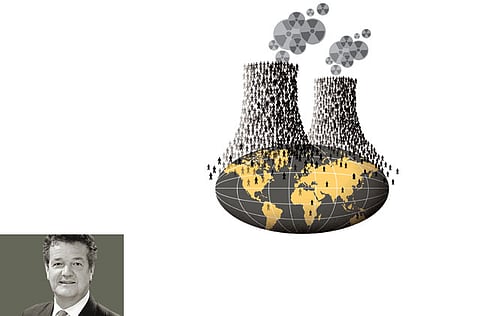Billions of ambitious people will welcome nuclear energy
Developing world wants lots of power and will not accept the argument that it remains the right of rich nations

The world has hit a population of seven billion people, and this is likely to rise to nine billion in the foreseeable future. Gradually spreading prosperity means that more and more people are looking for better lifestyles and are demanding utilities like clean running water in their homes, reliable supply of electricity, better roads, municipal services and telecommunications. And at the higher end of the scale increasing numbers of people want sophisticated services which make them part of the global community, like broadband connectivity and satellite TV.
All this activity has a profound social impact around the world, as tens of millions of people demand a more secure and productive role in society, and increasingly are not willing to accept marginalisation. Governments which try to keep their populations repressed will find their task increasingly difficult.
More and more governments will have to find a new role in facilitating their populations' access to the global world which they can see on their TV screens and hand-held devices every minute of every day. Deprived populations now know what they are missing out on, which makes it much less likely that they will accept their lot so willingly.
All this social and technological activity comes at a price: it needs energy, and lots of it. It is getting more obvious by the year that the billions of people on the march for a better future cannot be turned back, and they cannot be supplied by existing forms of energy.
Hydrocarbons cannot be burnt for centuries to come as they will run out, and renewable sources like water and wind are not able to supply enough power to meet the demands of seven billion ambitious humans.
The answer lies in nuclear energy. It is very powerful, and has no carbon emissions, but it is fraught with political problems only because the same process that prepares the enhanced fuel for peaceful civilian power plants can be used to make fuel for nuclear bombs. Nonetheless, nuclear energy is the only way that the human race will meet its ambitions for the next 100 years. This is why so many countries have turned to nuclear power, and many countries in the Middle East plan to develop peaceful nuclear power plants. The UAE is leading the way with its 5.6GWe (gigawatt electrical) Braka project on the coast of Abu Dhabi. It is being built with South Korean support and is expected to be completed by 2020. The UAE's revolutionary refusal to handle fuel enhancement is greatly increasing its international political acceptability.
Turkey has been talking since early 2006 about building three nuclear power plants to produce 4500MWe of power by 2012-15 near the Black Sea city of Sinop. In May 2008, Turkey signed a civil nuclear cooperation agreement with the US. It signed another with South Korea in June 2010.
The Iranians have attracted a lot of unfavourable attention for their apparently undeclared nuclear activities with military potential, but even their civilian operations have major problems. The Iranians planned to open a 1000MWe plant at Bushehr using the infrastructure which was already there, but the Russian joint venture partners had problems and there was a two-year delay. Although the reactor was eventually started in May this year, it was connected to the grid only in September, and it is due to start commercial operations only in January 2012.
The Iranians are on the brink of a major row with the US and other western powers which see its nuclear plans as dangerous. This US-led perception is starting to see some resistance from all sorts of sources: There was an unusual presentation to the International Atomic Energy Agency (IAEA) by the 100-member Non-Aligned Movement (NAM) with India joining the criticism of IAEA Director-General Yukiya Amano's recent report on Iran's alleged development of military nuclear technology.
India associated itself with a NAM statement which criticised the language used in the IAEA report when it said that "NAM notes with concern the possible implications of the continued departure from standard verification language in the summary of the report," which was read during the IAEA Board of Governors meeting last week on behalf of over 100 NAM member states, including India.
NAM wanted the IAEA to take a more neutral stance, and to look into other nuclear violations like Israel's nuclear activities, or Syria's alleged nuclear site that was bombed by Israel in 2007. But NAM was very critical of Amano for accepting western intelligence information on Iran's nuclear activities without any independent verification.
The procedures followed by the IAEA were strongly disparaged by the NAM, and the Indian government added that Iran has an "inalienable right" to use atomic energy for peaceful purposes, even if it must abide by "international rules and obligations".
The global drive to find enough energy for the rapidly increasing world population will find governments all over the world having to insist on their right to nuclear power as a matter of urgency. Nuclear power can no longer be treated like a luxury which can be limited to the rich nations of the West, but has to become a standard part of any nation's power architecture.
Sign up for the Daily Briefing
Get the latest news and updates straight to your inbox



